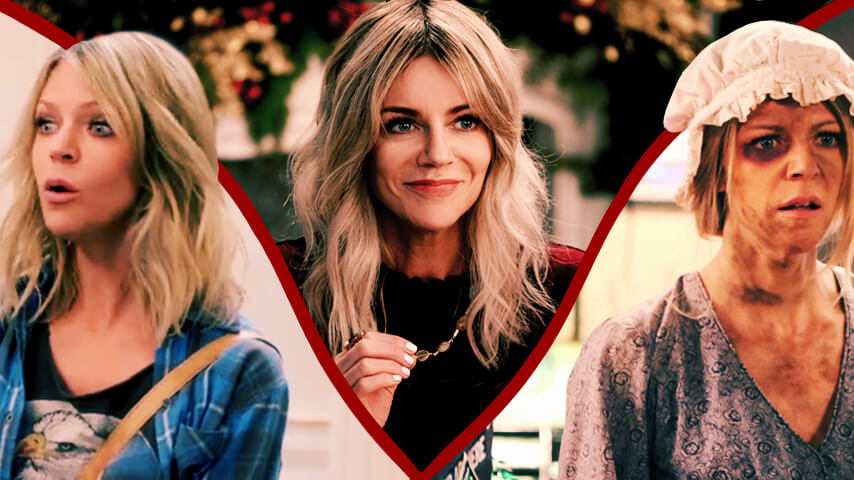Kaitlin Olson is the queen of chaotic comedy
For two decades, the actor has turned put-downs, pratfalls, humiliations, and drunken brawls into things of exquisite, hilarious beauty
From left: Olson in The Mick (Screenshot: FOX/YouTube), Hacks (Photo: John Johnson/Max), and It’s Always Sunny In Philadelphia (Photo: Patrick McElhenney/FX)
To talk about Kaitlin Olson’s comedic genius is to invoke, and attempt to describe, chaos. (It’s controlled chaos, for sure, as there’s little in her on-screen demeanor that suggests otherwise.) And to watch her on television, whether as part of the Gang in FXX’s long-running It’s Always Sunny In Philadelphia, in the Emmy-winning Max show Hacks, or even in her upcoming riff on the network procedural, High Potential, is to witness a performer who doesn’t so much relish diving headfirst into comedic mayhem as she enjoys being its central architect. For two decades, the Portland-born actor has honed a very specific brand of humor. You may be tempted to dub her the dirtbag queen of American TV comedy (the boys on Sunny might agree with that), but that still sells her short.
Any and all discussions of Olson’s talents must begin with Deandra “Sweet Dee” Reynolds. The bartender at Paddy’s Pub remains, to date, her most fully realized creation. It helps that she’s had sixteen seasons (and 170 episodes!) to turn her It’s Always Sunny in Philadelphia character into a vain, violent, and volatile presence whose drunken exploits and romantic and sexual misadventures, not to mention talentless career aspirations, have given fodder to some of that comedy’s most inspired moments. At one time the most level-headed of that Philly bunch, Dee soon became a wrecking ball in her own right, equally crippled and fueled by bitter grudges and oft-imagined grievances that made her irascible and hysterical. In any given scene, she could toy with wounded vulnerability before tapping into an endless well of anger that made her fit right at home with the hilariously disagreeable men she couldn’t dare live apart from.
With Dee, Olson didn’t just push past the concept of likability and respectability. She bulldozed right through it. Dee may have spent the better part of two decades being the butt of jokes and snickers from her twin brother, father, and fellow bar colleagues. (An ongoing gag centers on how they all think of her as a giant bird, after all.) But rather than have that dim her, Dee has blossomed instead into a full-blown narcissistic sociopath of sorts who can go toe to toe with the likes of Dennis (Glenn Howerton), Frank (Danny DeVito), Charlie (Charlie Day) and Mac (Olson’s husband, Rob McElhenney).
With The Mick, the FOX sitcom that premiered in 2017, audiences were greeted with a riff on Dee that felt more appropriate for broadcast television. Her Mickey was equally as adrift in her life as Dee but where that Philly-dweller could spend her days trying on wedding dresses for a ceremony that wasn’t even real or drunkenly fighting Mac in front of a rich man she hoped to woo, Mickey was a character forced to grow up if she was to raise her spoiled niece and nephews, whom she’s saddled with when her sister and brother-in-law flee their lives in Greenwich, Connecticut, to avoid a federal indictment. From the moment you meet her (at a grocery store where she drunkenly wreaks havoc on any and all things she comes in contact with), Mickey is a mess. On day two of living in her sister’s mansion, she’s found unconscious donning a wine-stained wedding dress by the kids she will then proceed to try to bully and bend to her will—with mixed results, of course.
Hitting a decidedly more warmhearted note than It’s Always Sunny In Philadelphia, The Mick nevertheless allowed Olson to play a woman struggling to leave her wayward ways behind. The bulk of the humor of this two-season wonder of a sitcom came from watching an adult who rebuked authority and responsibility clash with kids who needed and did away with both of those things with careless ease. At every turn, Mickey’s attempts to drive order into the chaos that the Greenwich mansion becomes (at one point, it’s so soiled and messy that it all but looks like a Hoarders episode) lead her into ever more outlandish situations. A toughened Rhode Islander who’s not afraid to jump from a balcony onto a moving car, who opts to take LSD to better help her niece during a pivotal day at school, and who cannot fathom disciplining her sweet youngest nephew (until she does, spanking him in public at a school rager, no less), Mickey allowed Olson to lace her on-screen dirtbag demeanor with a softer side that emerged begrudgingly by the end of every episode.
 Keep scrolling for more great stories.
Keep scrolling for more great stories.
